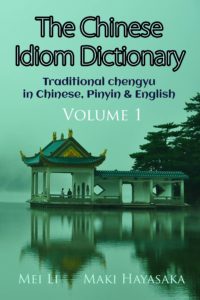A Resource for Learning Chengyu
 The Chinese Idiom Dictionary by Mei Li and Maki Hayasaka is a massive collection of traditional chengyu, carefully organized for easy reference.
The Chinese Idiom Dictionary by Mei Li and Maki Hayasaka is a massive collection of traditional chengyu, carefully organized for easy reference.
Each idiom is provided in its traditional form, with both Pinyin and English translations accompanying them. In addition, every expression has a detailed note of its traditional source to give readers a deeper understanding of the context that surrounds and informs each saying, faithfully preserved in Chinese.
For anyone with an interest in Chinese language, culture, or philosophy, don’t miss out on this authoritative three-volume collection!
An Abridged Sample of the Dictionary
Here is a small sample of the thousands of chengyu that are detailed in The Chinese Idiom Dictionary.
–––––A–––––
āi
哀兵必胜
āi bīng bì shèng
Meaning: An army burning with righteous indignation is certain to win.
Reference: 《老子》第六十九章
Quote: “祸莫大于轻敌,轻敌几丧吾宝,故抗兵相加,哀者胜矣。”
挨家挨户
āi jiāi hù
Meaning: From house to house / from door to door (typically in describing a search).
Reference: 老舍《四世同堂》七四
Quote: “自从他作了副县长,随着白巡长挨家挨户地收铜铁,他的美誉便降落了许多。”
ài
爱不释手
ài bù shì shǒu
Meaning: To love something too much to part with it.
Reference: 南朝·梁·萧统《陶渊明集序》
Quote: “余爱嗜其文,不能释手。”
爱财如命
ài cái rú mìng
Meaning: To love gold [wealth] as one’s life.
Reference: 清·岭南羽衣女士《东欧女豪杰》第四回
Quote: “我想近来世界,不管什么英雄,什么豪杰,都是爱财如命,何况吃官司的,少不免要和那些狼官鼠吏交手,这更没钱不行了。”
ān
安步当车
ān bù dàng chē
To walk leisurely instead of riding (in a carriage).
Reference: 《战国策·齐策四》
Quote: “晚食以当肉,安步以当车,无罪以当贵,清静贞正以自虞。”
安不忘危
ān bù wàng wēi
Don’t forget about danger in times of peace.
Reference: 《周易·系辞下》
Quote: “是故君子安而不忘危,存而不忘亡,治而不忘礼,是以身安而国家可保也。”
àn
按兵不动
àn bīng bù dòng
To halt the troops and wait instead of plunging into battle. / To bide one’s time.
Reference: 《吕氏春秋·恃君览》
Quote: “赵简子按兵而不动。”
按步就班
àn bù jiù bān
Step by step / To adhere to conventional ways.
Reference: 语出晋·陆机《文赋》
Quote: “观古今于须臾,抚四海于一瞬。然后选义案部,考辞就班。”
–––––B–––––
bā
八纮同轨
bā hóng tóng guǐ
Unity (refers to a faraway place in all directions: a unified world).
Reference: 《晋书·武帝纪》
Quote: “廓清梁、岷、包怀扬、越,八纮同轨,祥瑞屡臻。”
八九不离十
bā jiǔ bù lí shí
Quite close. / About right.
Reference: 老舍《柳屯的》
Quote: “可是比较的,我还算是他的熟人,自幼儿的同学。我不敢说是明白他,不过讲猜测的话,我或者能猜个八九不离十。”
八面玲珑
bā miàn líng lóng
To be able to please everybody. / To facilitate social relations in a smooth manner.
Reference: 唐·卢纶《赋得彭祖楼送杨宗德归徐州幕》诗
Quote: “四户八窗明,玲珑逼上清。”
bá
拔刀相助
bá dāo xiāng zhù
To draw one’s sword and provide help.
Reference: 宋·释道元《景德传灯录》卷二十二
Quote: “师曰:‘路见不平,所以按剑。’”
拔苗助长
bá miáo zhù zhǎng
Haste makes waste.
Reference: 《孟子·公孙丑上》
Quote: “宋人有闵其苗之不长而揠之者,茫茫然归,谓其人曰:‘今日病矣,予助苗长矣。’其子趋而往视之,苗则槁矣。”
bái
白璧微瑕
bái bì wēi xiá
A minor blemish or imperfection.
Reference: 南朝·梁·萧统《陶渊明集序》
Quote: “白璧微瑕,惟在《闲情》一赋。”
白璧无瑕
bái bì wú xiá
Perfect moral integrity. / Flawless white jade.
Reference: 宋·释道原《景德传灯录》卷十三
Quote: “问:‘不曾博览空王教略,借玄机试道看。’师曰:‘白玉无瑕,卞和刖足。’”
白藋同心
bái diào tóng xīn
The heart is like wild grass (describing the envy of wealth and splendor).
Reference: 北周·庾信《竹杖赋》
Quote: “秋藜促节,白藋同心。终堪荷蓧,自足驱禽。”
bǎi
百步穿杨
bǎi bù chuān yáng
To shoot with great precision (i.e., archery or marksmanship).
Reference: 《史记·周本纪》
Quote: “楚有养由基者,善射者也,去柳叶百步而射之,百发而百中之。”
百川归海
bǎi chuān guī hǎi
All things tend to move in one direction.
Reference: 《淮南子·汜论训》
Quote: “百川异源,而皆归于海。”
百读不厌
bǎi dú bù yàn
To be worth reading one hundred times.
Reference: 宋·苏轼《送安惇秀才失解西归》诗
Quote: “旧书不厌百回读,熟读深思子自知。”
–––––C–––––
cái
才貌双全
cái mào shuāng quán
Talented and attractive (especially in describing women).
Reference: 元·白朴《墙头马上》第一折
Quote: “七岁草字如云,十岁吟诗应口,才貌两全,京师人每呼少俊。”
才疏学浅
cái shū xué qiǎn
To have little talent and little learning (a humble phrase used in reference to oneself).
Reference: 南朝·梁·刘勰《文心雕龙·神思》
Quote: “若学浅而空迟,才疏而徒速,以斯成器,未之前闻。”
财运亨通
cái yùn hēng tōng
The road to wealth is wide open.
Reference: 清·李汝珍《镜花缘》
Quote: “谁知财运亨通,飘到长人国,那酒坛竟大获其利。”
cān
餐风饮露
cān fēng yǐn lù
The hardships of travel or outdoor life.
Reference: 明·王守仁《瘗旅文》
Quote: “餐风饮露,无尔饥兮。”
cán
餐风饮露
cān fēng yǐn lù
To make a very difficult journey.
Reference: 明·王守仁《瘗旅文》
Quote: “餐风饮露,无尔饥兮。”
残杯冷炙
cán bēi lěng zhì
The leftovers of a meal.
Reference: 北齐·颜之推《颜氏家训·杂艺》
Quote: “不可令有称誉,见役勋贵,处之下坐,以取残杯冷炙之辱。”
cǎn
惨不忍睹
cǎn bù rěn dǔ
To be too horrible to look at.
Reference: 唐·李华《吊古战场文》
Quote: “伤心惨目,有如是耶!”
惨绝人寰
cǎn jué rén huán
To be very cruel.
Reference: 峻青《故乡杂忆》
Quote: “指挥着几百万美械装备的大军,向解放区进行着惨绝人寰的大屠杀。”
惨无人道
cǎn wú rén dào
Inhuman cruelty.
Reference: 蔡东藩《唐史演义》第五十二回
Quote: “将妃、主等人,一一剖心致祭,惨无人道。”
Stay in Touch!
What chengyu have you come across in your studies or day-to-day conversations? Drop us a comment to let us know what some of your favorites are!
I hear “司空见惯” quite often (mostly from my co-worker).
Hi Jun,
Yeah, expressions like these can easily become a habit for people. For any students of Chinese, try to avoid overusing chengyu in your own speech – you’ll create a much better impression that way. On the other hand, by knowing just when to use the appropriate chengyu, you’ll come a lot closer to sounding like a native speaker.
倾盆大雨 (basically to rain cats and dogs) is a pretty common one that I hear. My Chinese friend was surprised to hear me use it myself. She didn’t think I would know any chengyu.
Hi Justin,
That’s a very popular one – thanks for sharing!
Learning chengyu has helped me fall in love with learning Mandarin all over again. It’s a difficult language, but it’s so interesting once you get a handle on it.
Hi there, this weekend iis pleasant for me,
since this time i am reading this impressive educational article here at myy home.